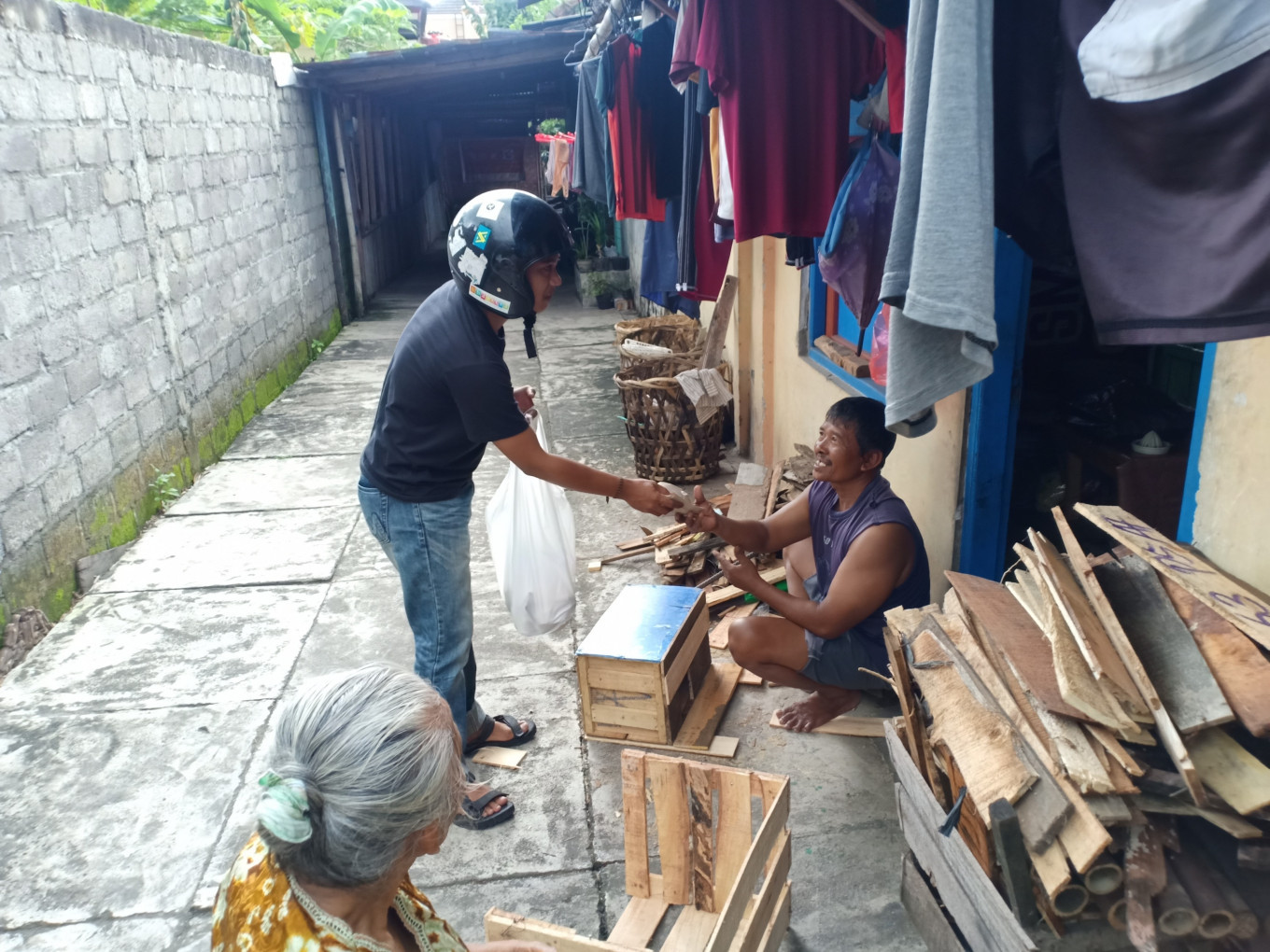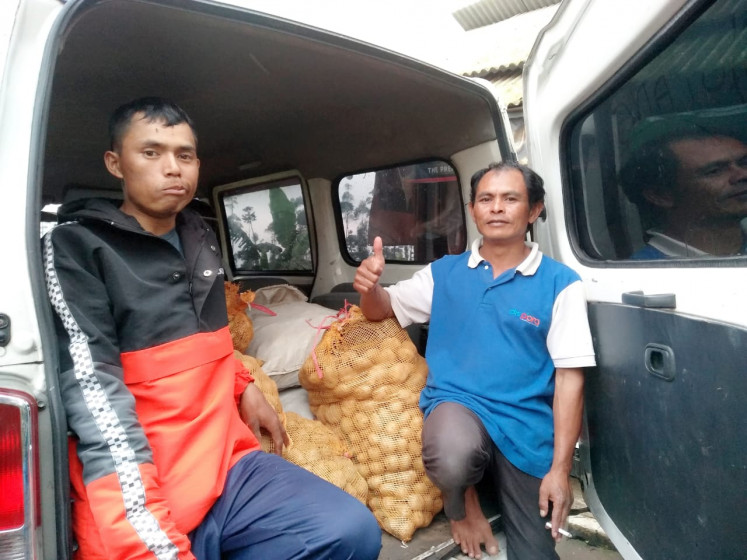Popular Reads
Top Results
Can't find what you're looking for?
View all search resultsPopular Reads
Top Results
Can't find what you're looking for?
View all search resultsIn Indonesia, rural helps urban to ensure food supply during coronavirus pandemic
Farmers associations in Java and Sumatra share their harvest to help poor urban dwellers or those who have lost their income in cities.
Change text size
Gift Premium Articles
to Anyone
A pickup truck full of vegetables — sweet cassava leaves, water spinach, eggplants, long beans, chilis and pumpkins — stopped at a public kitchen run by Sleman residents in Yogyakarta.
The cooks will send the ready-to-eat food to people who have lost their income during the COVID-19 pandemic, such as pedicab drivers and sex workers.
“We donate the vegetables for humanitarian reasons. We have a bountiful harvest while there are people who need it now,” said Widodo, one of the farmers in the Coastal Farmers Association in neighboring regency Kulon Progo.
The farmers in the association grow food on 2,600 hectares of land. Since 2005 they have been in a fight to secure their agriculture fields from being turned into a sand mining area by the Yogyakarta provincial administration.
Even though they have problems of their own, it did not keep them from getting involved in a solidarity movement. A crisis like this, said Widodo, could be a reminder that people need food more than sand.
Rural helps urban
M. Taufiq Firdaus, a coordinator of one of the public kitchens organized by Jogja Food Solidarity, said the donations from the farmers were good for hundreds of portions of healthy meals.
“This has helped us a lot,” he said.
Some street musicians had also gotten some vegetables from the Kulon Progo farmers. “We are grateful for the free vegetables,” Gonjes Matopane, one of the street musicians, said.
In West Java, a farmer community used local wisdom to pitch in and help the urban poor to get food during the pandemic.
About 250 farmers in Kampung Karikil and Kampung Ciharungkat in Sukatani vilage, Garut, West Java, gave their agricultural yields through the Pasundan Farmers Union to help the urban poor who had lost their income during the COVID-19 pandemic in Bandung, the capital of West Java.
The two kampungs have so far donated 250 kilograms of potatoes and 55 kg of carrots. “We donated this to the urban poor. I can imagine if you’re rich, you can buy anything you want. But what about those who have lost their income? So after some talks, we agreed to donate our rice savings to others,” Asep Sutiandi, one of the farmers, said on April 16.
Other farmers in the Pasundan Farmers Union donated rice, coconuts and bananas to the urban poor in Jakarta on April 9.
“It is our obligation, as members of the union, to build solidarity and help others regardless of their ethnicity and religion,” said Asep.
Asep Sutiandi (right) and a fellow farmer, who are members of the Pasundan Farmers Association, pose near potatoes that will be sent to a collective barn as part of the Agrarian Barn Movement organized by the association. The movement has proven useful during the pandemic. (Courtesy of Serikat Petani Pasundan/-)Yani Andriyani, a staff member at the union, said they had organized food donations through the Agrarian Barn Movement, which had proven useful during the pandemic.
Asep said the donation system was local wisdom. The most common system is called beras perelek, in which farmers save a cup of rice a week in a bamboo tube placed in front of the house. Usually they would later accumulate all the rice savings from other farmers to help others or buy communal facilities.
Sandyawan Sumardi, the coordinator of Jakartans Solidarity House for Humanity, said last week the Banten Farmers Association had sent food for Jakarta’s low-income residents within the solidarity network.
The farmers sent 100 kg of rice and 100 kg of bananas. The solidarity house has so far sent out food to hundreds of people as well as cloth masks. Sandyawan said not all of the hundreds within the network were eligible for government aid.
Earlier this month, farmers from the Kendeng mountains in Central Java, an organized farmers group that had fought against cement factories in their region, also helped another organized, underprivileged community, namely the Urban Poor Linkage (JRMK) in Jakarta, by selling their rice for lower than the market price. For the first batch, the farmers sent 9 metric tons of rice straight to Jakarta.
The solidarity was reciprocal.
Damar Panca from the Confederation of Labor Associations said during a recent webinar that after receiving a ton of rice from farmers, some of the workers sewed cloth masks to be given to the farmers.
Reviving traditions
Farmers in Jambi have been helping each other out with food. During the COVID-19 pandemic, they have widened their farmer networks and gone back to the old way of bartering food.
“This is a trying time. We haven't had any help from anyone. So we help each other,” Jamilah, a villager in Mundung Darat said last week.
The farmers in her village are rice smallholders with no more than 2 hectares per family.
Her neighbor, Mustika, said her latest harvest did not yield as much as usual because snails ate some of her rice. But she was not worried about that because the village had long had a system of helping each other.
Samsudin, a farmer in a neighboring village in Jambi Tulo village, bartered their vegetables with rice from farmers in a neighboring village.
This way, he said, they could weather the crisis. Moreover, the price of vegetables in markets were fluctuating so it was more profitable to barter.
Central Java Governor Ganjar Pranowo called on farmers to revive the traditional jimpitan (pitching-in) system, in which all farmers set aside some of their harvest for the whole village, including donating food for poorer villagers or those who have lost their income.
Suherdjoko contributed to the story from Semarang











